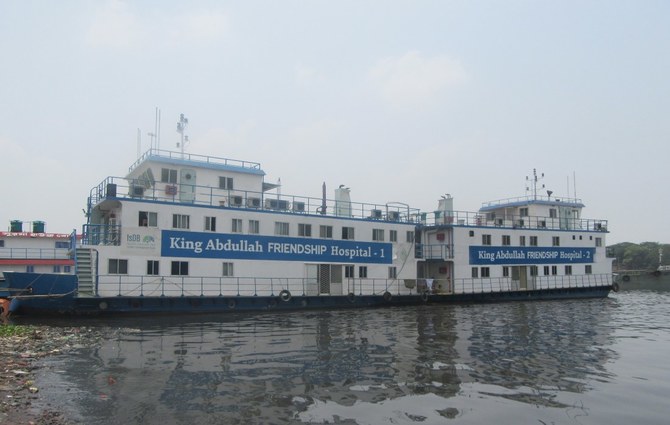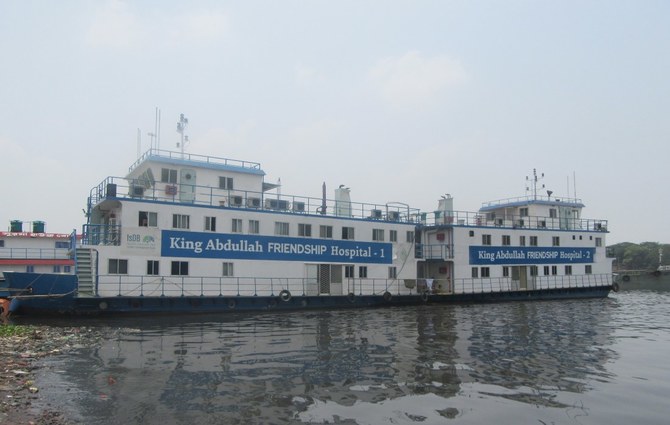DHAKA: Five Saudi-funded floating hospitals will bring healthcare to tens of thousands of patients in remote areas of Bangladesh, with their operator expecting the first two vessels to be launched shortly after Ramadan.
Bangladesh occupies the world’s largest delta, and a third of the country is under water most of the time. Devastating storms often form over the Bay of Bengal and flood the country’s south, leaving many regions accessible only by river.
Few of these rural areas have medical facilities and the five hospital ships, all named after King Abdullah and funded by the Islamic Development Bank, will traverse the waterways of Bangladesh to provide healthcare to impoverished communities.
Under a 2017 agreement signed by the bank and the Bangladeshi Directorate General of Health Services, the floating hospitals will be initially operated by Friendship, an NGO that has been running hospital ships in Bangladesh for over two decades. After that, the vessels will be handed over to health authorities.
“It’s a tripartite project,” Dr. Sheikh Daud Adnan, head of hospitals at the health directorate, told Arab News.
“The project is for five years, and during this time the ships will run under the supervision of Friendship. After five years, the ships will be handed over to the directorate.”
The cost of building the ships and the first five years of operation is about $20 million. Two of the vessels are already complete and ready to sail, pending registration with Bangladeshi authorities, which Friendship expects to be finalized soon after Ramadan.
“Our people are ready and we have already trained our staff. Everything is ready. I hope the first two ships will float by June or even before,” Runa Khan, the NGO’s executive director, said.
“All the ships will be named after King Abdullah. They will run as King Abdullah Friendship Hospital 1-5.”
The vessels have been built in the Narayanganj shipyard, about 20 km from the Bangladeshi capital Dhaka.
The biggest ship, King Abdullah Hospital 1, is 31 meters long, and has an operating theater for general surgical operations and a separate theater for eye surgery. The other four ships will be 25 meters long, and will provide primary healthcare and minor operative procedures.
The hospital ships lwill run on the Padma River, the Meghna River in the northeastern district of Sunamganj, and in the southeastern regions of Hatiya.
Each ship will have up to 30 crew — more than half of them medical professionals, and the rest responsible for running the vessels and administration. During the duty period, all will stay on board in their residential cabins.
Each ship will anchor in a particular location for two-and-a-half months. The hospital crew will have a database of patients prepared in advance by paramedics on the ground, Khan said.
“In order to maintain a smooth follow-up and registration, we have community medics or satellite clinics at every location where the ships will anchor..
“These are all mobile clinics. Every month, we conduct mobile clinic services where paramedics attend to the patients. The paramedics refer the patients to our ship hospitals if they can’t treat them. This is how we have the database of the patients to be treated before the ship reaches the particular area,” Khan said.
She estimated that each hospital ship, supported by the mobile clinics, will treat up to 350,000 people every month.
Services will be almost free of charge, as the ships will visit areas lacking medical facilities and where many cannot afford the journey to access proper healthcare.
“We do this almost free of cost. The charge is within 10 US cents,” Khan said.
“They can’t go to healthcare facilities. Healthcare has to reach them. With the river system, we can reach these people easily.”
Saudi-funded floating hospitals to bring healthcare to rural Bangladesh
https://arab.news/w8waj
Saudi-funded floating hospitals to bring healthcare to rural Bangladesh

- Five ships will use Bangladeshi river networks to provide medical aid to impoverished communities
- First two vessels are ready and due to be launched by June, hospital operator says
UAE’s Sheikh Tahnoon ‘welcome anytime’: Saudi media minister

- Sheikh Tahnoon “comes to the Kingdom whenever he wants without permission; it is his home and its leadership is his family,” the Kingdom’s media minister wrote on X
RIYADH: Saudi Arabia’s Media Minister Salman Al-Dossary refuted on Wednesday allegations circulating on social media that the Kingdom has denied entry to the UAE’s National Security Adviser Sheikh Tahnoon bin Zayed.
“What is being circulated about the Kingdom refusing to receive His Highness Sheikh Tahnoon bin Zayed is incorrect. His Highness comes to the Kingdom whenever he wants without permission; it is his home and its leadership is his family,” the minister wrote on X.
Sheikh Tahnoon is the Deputy Ruler of Abu Dhabi and brother of the UAE’s President Sheikh Mohamed bin Zayed.
Saudi Arabia’s Foreign Minister Prince Faisal bin Farhan said on Tuesday that while there had been a “difference of view” between the two countries over Yemen, their relationship was “critically important” for regional stability.
“The Kingdom is always keen on having a strong, positive relationship with the UAE as an important partner within the GCC,” he said.
He said the UAE’s withdrawal from Yemen served as a “building block” for the relationship with the Emirates to continue strong.
Last month, Yemen’s internationally recognized government asked the UAE to withdraw its forces from the country after the separatist Southern Transitional Council (STC) that it supported seized large areas in the south and east.
The Saudi-led military Coalition to Support Legitimacy in Yemen said on December 30 that it had conducted a “limited” airstrike against shipments of smuggled weapons destined to the STC.
The UAE defense ministry said it completed a full withdrawal from Yemen on January 2.













